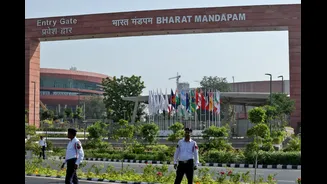Orbital Near-Miss
A recent incident in space has prompted India to accelerate its space safety measures. Reports indicate that India is considering the deployment of 'bodyguard'
satellites after a risky orbital near-miss occurred. This near-miss served as a stark reminder of the dangers present in the increasingly congested and potentially hostile environment of outer space. The incident has highlighted the need for enhanced protection of India's satellites and other space-based assets. This proactive approach reflects India's growing recognition of the strategic importance of space and its commitment to preserving its space capabilities.
Protective Satellite Plan
The proposed 'bodyguard' satellites represent a critical element in India's space security strategy. These satellites would function as a defensive shield, designed to detect, track, and potentially neutralize threats to Indian space assets. The specific details of the satellites' capabilities and deployment are still under development, but the intention is clear: to establish a robust and responsive system that can effectively safeguard India's space infrastructure. This initiative suggests the Indian government's focus on building an integrated space security architecture, which involves a combination of surveillance, early warning systems, and defensive capabilities. This is a crucial step to protect the nation's investments in space.
Safeguarding Space Assets
The need for 'bodyguard' satellites arises from the increasing vulnerability of critical space assets. Satellites are vital for communications, navigation, weather forecasting, and defense, and their disruption could have severe consequences. India's space program is a strategic national asset, underpinning the country's economic growth, national security, and global standing. These protective satellites seek to ensure the continued availability and reliability of essential services derived from space-based infrastructure. The program underscores India's determination to protect its space investments and guarantee the resilience of its critical infrastructure against various potential threats.
Growing Space Threats
The decision to deploy 'bodyguard' satellites comes at a time of growing concern about space security. Space is becoming increasingly congested, with a proliferation of satellites from various countries and private entities. This increasing density introduces the risk of collisions, intentional or unintentional, as well as other security risks. Additionally, some nations are actively developing anti-satellite weapons. The situation necessitates proactive measures to protect space assets from both physical and electronic attacks. The program indicates India's recognition of these evolving threats and its determination to maintain its access to and utilization of space.
Strategic Significance
The development of 'bodyguard' satellites has substantial strategic implications for India. It signifies India's commitment to maintaining its position as a significant space power and protecting its national interests in the space domain. Moreover, it strengthens India's ability to contribute to international space security efforts, which can help in creating norms of responsible behavior in space. This proactive move underscores India's commitment to enhancing its defense capabilities and protecting its critical infrastructure. By securing its space assets, India can sustain its economic development, security, and international influence, and make further contributions to space exploration.















